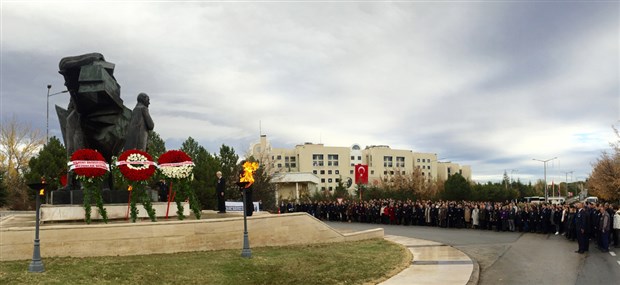 November 10, 2016, marked the 78th anniversary of the death of Turkey’s beloved Atatürk. Bilkent University commemorated the solemn occasion with a ceremony and a concert.
November 10, 2016, marked the 78th anniversary of the death of Turkey’s beloved Atatürk. Bilkent University commemorated the solemn occasion with a ceremony and a concert.
The ceremony began at Bilkent’s Atatürk Monument with a moment of silence. It then continued at Mithat Çoruh Auditorium with a mini concert of pieces by Dvorak, performed by Bilkent students Elif Ece Cansever (violin), Mustafa Orkun Pala (violin), Elif Başak Genç (viola), Yiğit Ülgen (violoncello) and Korkmaz Can Sağlam (piano).
Following the concert, fourth-year Department of Law student Bengisu Delibalta gave a talk, “Moving Atatürk’s Body from the Ethnographic Museum to Anıtkabir.” The talk was based on the HIST200 (History of Turkey) course project that she and her fellow team members Cansu Doğan, Emel Özaltun, Berk Kılıç and Aybike Gündoğdu had prepared. Bengisu spoke about the death of Atatürk and the moving of his remains to Anıtkabir, using historical documents as references.
The commemoration concluded with a tribute given by Asst. Prof. Saime Özçürümez of the Department of Political Science and Public Administration, titled “Thinking with Atatürk.”
Dr. Özçürümez began her remarks by stating that we live in a world where global and local challenges, individual and societal problems and national and world matters are intertwined. In this day and age, the most daunting task is to think properly and clearly, to make good decisions and to implement those decisions properly. Referring to Atatürk as the “thinking leader” of a nation who transcended his own time, Dr.
Özçürümez drew attention to his brilliant success in all these areas, due to his ability to reason through challenges and accomplish his goals. She attributed this ability to his practice of extensive reading, noting that he read in multiple languages and multiple disciplines, personalized the knowledge he acquired from his reading, and shared that personalized knowledge through dialogue with others and also through his numerous writings. For examples of Atatürk’s thoughts on the relationship between the individual and the state, and their roles in each other’s advancement, Dr. Özçürümez quoted passages from “Medeni Bilgiler” (Knowledge Concerning Civilization). She also touched on the role of education and particularly universities as being central to advancing the acquisition of knowledge. She concluded by declaring that “thinking with Atatürk” is possible through the personalized acquisition of knowledge, hard work, and development of a consciousness that prioritizes progress above all else.
